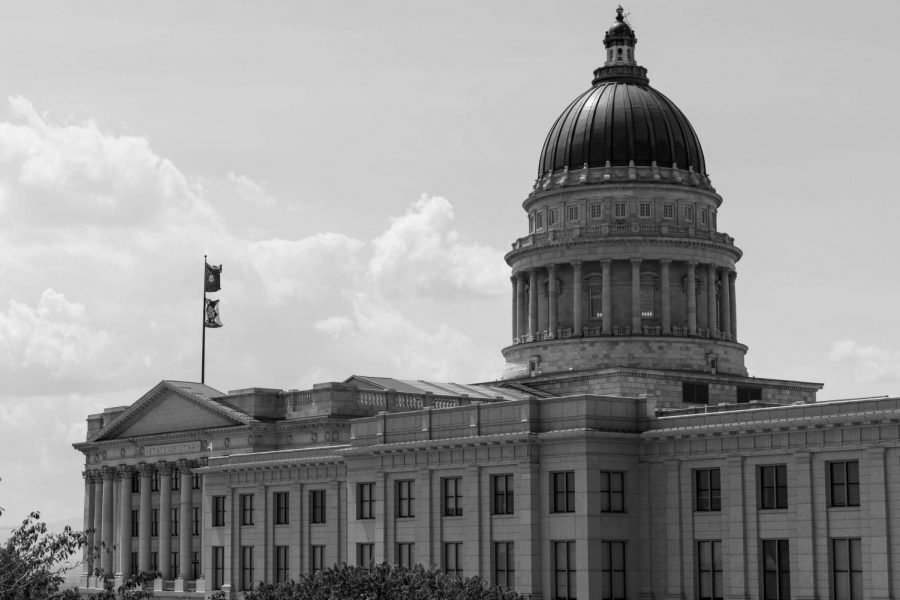Petters: Jim Crow 2.0 is in Mississippi and It Won’t Stop There
A view of the Utah State Capitol Building in Salt Lake City on Aug. 21, 2021. (Photo by Kevin Cody | The Daily Utah Chronicle)
April 21, 2023
Recently, Mississippi passed H.B. 1020, which is reminiscent of Jim Crow laws. The bill aims to limit voting access by appointing judges for Jackson instead of letting the city, which is prominently Black, elect these officials. In addition, the bill would extend the powers of the state police and divert tax dollars away from communities in need.
This legislation is part of a larger pattern of racist policies, practices and gerrymandering in Mississippi. Legislation like H.B. 1020 is currently being drafted in other states and will not end in Mississippi. Politicians will continue to take control over cities they deem “dangerous,” decreasing the power of the vote.
The legacy of Jim Crow laws in Mississippi can be seen in many aspects of contemporary society, including extreme economic inequality and racial disparities in health care. Even after the end of Jim Crow, racial suppression continued with Black voters continuously being disenfranchised. In 2020, Mississippi residents voted out a “Jim Crow-era provision” which restricted Black individuals from being elected to office.
Racial tensions have not disappeared, just diminished within media and public discourse.
Mississippi is also not the only state with the issue of representation within the political field. Only 26% of Louisiana’s state legislature is Black, underrepresenting its Black population. Closer to home, Utah’s largest minority, the Latinx population, only holds 3% of political seats while being around 15% of the population.
Representation is crucial for the United States — not only does it provide role models for future generations and build self-esteem in marginalized communities, but it also creates inclusive legislation.
H.B. 1020 was passed by individuals who claimed they pushed these policies forward for safety and to deal with crime, but these officials have given no support to true solutions involving crime in Jackson. This is not about safety, as the politicians claim, but rather about control.
Regarding the expansion of state police, this action could lead to further abuse of power. It’s no secret that communities of color are over-policed and we see police brutality. Take Michael Corey Jenkins’ case. Jenkins was a victim of state police abuse in Mississippi, and his story is an example of the dangers of increasing the state police’s power. We’ve seen police abuse their power in Utah too — see how they treat racial minorities versus the white population.
By appointing judges and expanding police powers, white politicians further control people of color and diminish their votes.
Legislation like H.B. 1020 will not end in Mississippi. We’ve already seen other examples of politicians in power attempting to control their population. Two vital examples are in Florida and Texas. Last August, Gov. Ron DeSantis expelled democratically elected state attorney Andrew Warren for not prosecuting offenses related to abortion or transgender health care. The Texas Senate recently passed a bill that prohibits prosecutors from adopting policies that allow them to use their discretion when deciding whether to prosecute a type of criminal offense. Another Texas bill creates an appointed council that would refer prosecutors to a trial court to be dismissed for incompetence if they don’t prosecute crimes the state wants them to.
We have also seen some of the most oppressive policies from Texas and Mississippi in the banning of certain classroom materials and books in schools. Conservative lawmakers’ rhetoric is clear and their attempts to control marginalized communities will continue.
We must increase media coverage on legislation like H.B. 1020. Locally, we must continue to educate ourselves on such bills and advocate for the removal of politicians who support the oppression of marginalized communities. Legislation that decreases the power of someone’s vote is not new and will continue until we take action to remove the officials pushing such legislation.
We are backpedaling as a country, and politicians abuse their power to maintain power and control the population. Their efforts are tyrannical, barbaric and horrific whether or not they are put into law.
Perhaps we need a coalition to help support politicians who care about actually representing. But one thing is for certain: the right to vote is one of the most important rights in the U.S. — and yet, still, we have to fight for it to actually matter.









Chantell Robinson • May 30, 2023 at 9:15 am
May God dismantle altar built to destroy his peace!